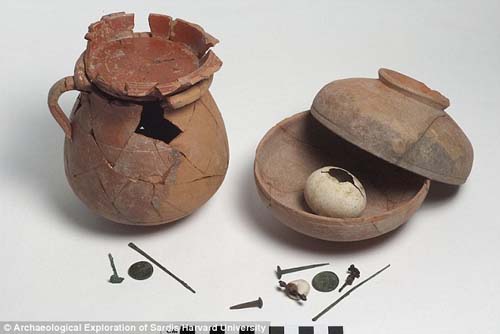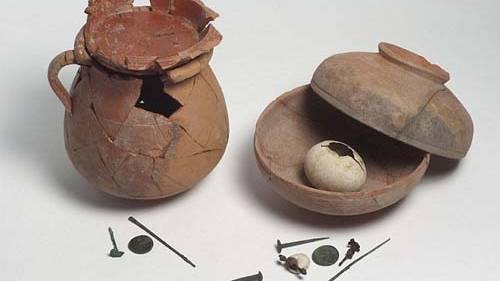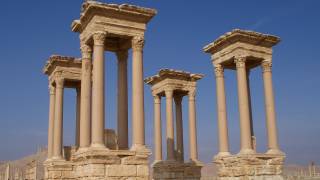2,000 year old egg found in newly discovered ancient Roman pots
In a rare find, archaeologists in Turkey have discovered Roman pots buried filled with tiny bronze tools and coins beneath the foundations of an elite building. The artifacts were found by researchers in Sardis, once the capital of the ancient kingdom of Lydia.The pots contained ’magical’ items and lucky charms to ward off demons - including an ancient eggshell, incredibly intact. It is thought they were buried under houses and with the dead to disarm evil forces.
Eggs played a role in the spiritual life of the ancient residents. According to reports, a hole would be made in the top of the egg and the contents would be left inside. The eventual smell was to tempt and trap demons. A whole egg would be used to place curses on enemies.

More on the discovery from LiveScience...
---
Ancient People Fought Demons and Disasters with Eggs
By Megan Gannon | LiveScience
[...]In the summer of 2013 archaeologists were excavating an ancient building at Sardis that was constructed after the earthquake. Underneath the floor, they found two curious containers that each held small bronze tools, an eggshell and a coin, resting just atop the remains of an earlier elite building that was destroyed during the disaster.
The objects in the odd assemblages were important in ancient rituals to keep evil forces at bay, and the archaeologists who found them believe they could be rare examples of how the earthquake affected ancient people on a personal level.
Walking on eggshells
One of the eggshells found under the floor at Sardis was amazingly still intact when excavators lifted the lid on the container last summer.
"That was really fantastic," Elizabeth Raubolt of the University of Missouri, Columbia told LiveScience "You can almost see where they chiseled a perfect circle and then let the contents aspirate."
Raubolt has worked on the excavations at Sardis (which are led by Nick Cahill of the University of Wisconsin-Madison) as a Roman pottery specialist for the past four field seasons. When she presented her findings this month at the Archaeological Institute of America’s annual meeting in Chicago, she noted that several superstitions in the ancient world involved eggs.
The Roman historian Pliny wrote about how people would immediately break or pierce the shells of eggs with a spoon after eating them to ward off evil spells. Eggshells were also put inside "demon traps" buried in modern-day Iraq and Iran to lure and disarm malevolent forces, Raubolt explained. And sometimes, whole eggs were buried at someone’s gate to put a curse on that person.
"You can imagine how nice it smelled after a while," Raubolt said.
With those precedents in mind, Raubolt thinks the eggshells at Sardis served as a way to protect the people in this building from evil forces, including future earthquakes, and maybe even curses cast by others.
[...]
Read the full article at: livescience.com






















